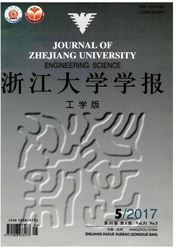

 中文摘要:
中文摘要:
针对双层结构预测控制面对一阶积分过程时无法形成稳态优化模型的问题,基于一阶积分过程的稳态特性,提出"临界稳态"的概念,给出了"临界稳态"状况下的"点"模型,以及"临界稳态"的成立条件(稳定性条件),由此建立积分过程的稳态优化数学模型.双层结构预测控制分为上层稳态优化和下层动态控制.上层稳态优化通过求解稳态优化数学模型得到最优稳态输出目标,下层动态控制使用基于模型的控制方法实现最优稳态目标的跟踪控制.将稳态优化问题求解过程中划分为两个阶段:可行性阶段与最优化阶段.在可行性阶段针对积分过程稳态优化模型中的稳定性条件给出相应的可行性判定与软约束调整算法,从而确保了最优化阶段解的存在性.仿真中,将所提出的积分型双层结构预测控制算法应用在一个多变量积分过程上.该优化控制系统一方面可以计算出系统的最优稳态输出目标,另一方面实现了对该目标的快速跟踪控制.
 英文摘要:
英文摘要:
Aiming at the problem that the model of steady state optimization cannot be formed for one-order integrating process in two-layer predictive control, the concept of "critical steady state" was proposed and then the "point" model and the establishment conditions of "critical steady state", i.e. stability condition, were presented. Thus the mathematic optimization model was built based on the steady property of one- order integral process. Two-layer predictive control is divided into upper steady state optimization layer and lower dynamic control layer. The optimal steady output target is obtained by the solution of the model of steady state optimization in the upper layer and also tracked by the model based control in the lower dynamic control layer. The solution process for the optimization problem is divided into two stages= feasibility stage and optimization stage. In the feasibility stage, the feasibility judgment and soft constraint adjustment method are presented for the stability condition of integrating process to guarantee the existence of the solution in the optimization stage. In simulation, the presented integral type two-layer predictive control algorithm is implemented on a multivariable integrating process. The optimal steady state output target can be calculated and also quickly tracked by this optimal control system.
 同期刊论文项目
同期刊论文项目
 同项目期刊论文
同项目期刊论文
 Stabilization via extended nonquadratic boundedness for constrained nonlinear systems in Takagi-Suge
Stabilization via extended nonquadratic boundedness for constrained nonlinear systems in Takagi-Suge Improved H-infinity Filtering for Markov Jumping Linear Systems with Non-accessible Mode Information
Improved H-infinity Filtering for Markov Jumping Linear Systems with Non-accessible Mode Information Embedded Interval Type-2 T-S Fuzzy Time/Space Separation Modelling Approach for Nonlinear Distribute
Embedded Interval Type-2 T-S Fuzzy Time/Space Separation Modelling Approach for Nonlinear Distribute Hammerstein Modelling with Structure Identification for Muti-input Multi-output Nonlinear Industrial
Hammerstein Modelling with Structure Identification for Muti-input Multi-output Nonlinear Industrial Stabilization via Extended Nonquadratic Boundedness for Constrained Nonlinear Systems in TakagiSugen
Stabilization via Extended Nonquadratic Boundedness for Constrained Nonlinear Systems in TakagiSugen Comments and Improved Results on H infinity Filtering for Discrete-time Systems with Randomly Varyin
Comments and Improved Results on H infinity Filtering for Discrete-time Systems with Randomly Varyin 期刊信息
期刊信息
